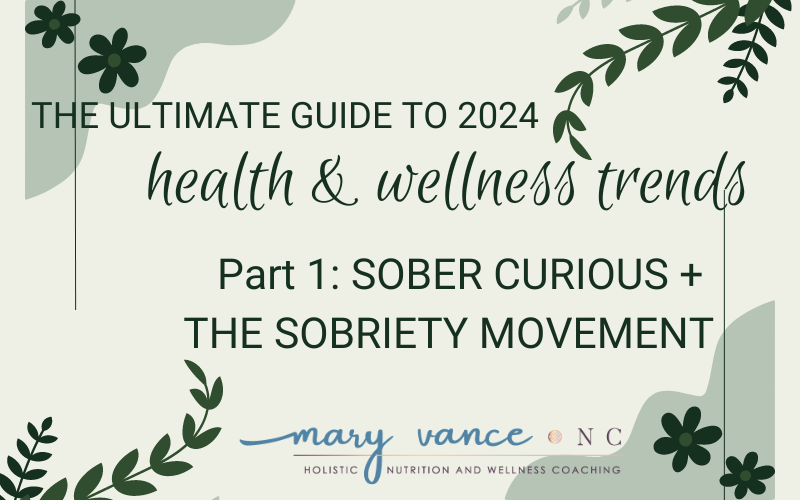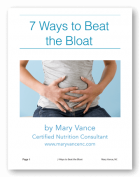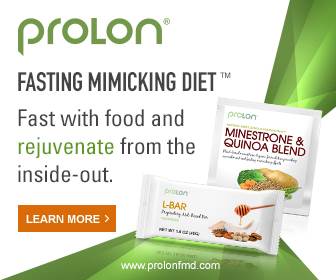It’s a new year (or if you’re reading this in the distant future, it was, at one point, a new year in 2024), and with a new year comes evolving trends in the health and wellness industry. To kick off this year, I decided to create a series to delve into the latest trends in nutrition and wellness to help you navigate what’s new to improve your health.
In this and the next five blog posts for this series, I’m going to examine what’s hot and beneficial in wellness so you know what to embrace and what to avoid to help you have the healthiest new year ever. I’ve waded through it all so you don’t have to!
Here are the upcoming topics in the series:
- Sobriety, the sober curious movement & alcohol free alternatives (today’s post)
- How the conversation around women’s sexual health is changing, including normalizing menopause + fun new products to enhance women’s sexual pleasure
- Home health testing to help you be your own best health advocate (and how to get the testing you want without having to fight your doctor)
- What’s new in bio-hacking
- Which supplements you’ll want this year
- Diet trends
So let’s get into it. For the first post in this series, I’m diving into sobriety and the sober curious movement.
Wellness and Nutrition Trends: Sobriety
I grew up in the 80s and attended college in the 90s. The culture was all about drinking back then: campus parties, fake IDs; all celebrations were punctuated by alcohol use. It was just part of our culture. Booze offered us a way to loosen up, embolden ourselves (do stupid things), make friends, blow off some steam. To this day, my generation, Gen X, and adults aged 35 to 54 are more likely to drink than their older and younger counterparts.
And it certainly became a regular part of my life. After college in my 20s, I’d go out for drinks after work on Thursdays and sometimes stay out til 2 or 3am, then roll into work smelling like booze the next day. It would continue Friday and Saturday. No biggie I thought; I’m just keeping it to the weekends. And I’m young! We’d party and binge drink every weekend, and it never crossed my mind to take a break or quit. It was just what we did.
The years rolled on, and my work and my relationships suffered. I’d get into alcohol-fueled fights with my boyfriend, once throwing a shoe at him that (fortunately) missed his head and put a hole in my wall. Soon my Thursday – Saturday drinking crept into the weeks, and at one point I was drinking more than a bottle of wine every night. For every celebration, every problem, every life transition, every dinner party, every vacation, every holiday, every stressor, every happy hour, and then just every day–wine was there.
Alcohol had a significant (negative) impact on all my relationships until around 2015 when I discovered and friended Holly (author of Quit Like a Woman). I started taking breaks from drinking. I noticed dramatic improvements in my wellbeing, anxiety levels, sleep, appearance, relationships, productivity, pretty much all areas of my life. For an anxiety sufferer like I was, alcohol was pouring gasoline on a fire. It’s the vicious cycle: We use it to relieve anxiety, only to have it disrupt our stress hormones and body chemistry so much that it creates more anxiety. So we drink again to get rid of that.
Putting down the bottle is hard work for most of us. It gets boring and lonely, and explaining yourself is annoying. I remember Holly telling me that alcohol is the only drug in which you have to justify not taking. No one hassles you when you tell them you got clean from hard drugs, but when you say you’re not drinking, pour on the peer pressure.
Sober Curious
These days, only between 18 and 20 percent of Americans of legal drinking age and under 28 years old said they regularly drank beer, wine or spirits. (source) Part of this trend is that younger generations seem more risk averse (source), and young people today know far more about health risks associated with these kinds of behaviors.
Enter the sober curious movement: the growing trend of people questioning their relationship with alcohol by choosing either to take a break from booze or quit altogether. The trend is driven by a number of factors, including concerns about the negative health effects of drinking that have recently come to our attention, the desire to improve overall health, and a growing awareness of the role that alcohol plays in our lives. Sober curious is about being more mindful of when and why you’re drinking. In my case, I noticed I hated being alone with my thoughts. I have the typical anxious worry-mind that feeds me a constant stream of negative thoughts (so fun) that I had to learn to control. And I still struggle with that. Meditation and therapy have helped.
In my younger years, we didn’t question alcohol’s role in our culture. You were either sober (usually because you had a “problem”), or you drank, and that was acceptable. Many of us grew up binge drinking– and stayed that way. If alcohol didn’t seem to negatively impact our lives (we can still get up and go to work! We’re not living on the street due to addiction! We can raise families and seem otherwise productive!), we didn’t have a problem. It was either addict or mostly sober. But many of us were “gray area” drinkers who weren’t considered addicts, but for whom alcohol was having a negative impact in subtle ways.
In fact, we were told that alcohol, especially red wine, had beneficial health effects. It reminds me of the 60s when nearly 50% of the population smoked, and doctors said smoking was good for you (!). In the late 60s, the Surgeon General released the first report on the negative health effects of smoking, stating that it caused lung cancer and bronchitis. Similarly, the past few years have brought many studies showing there is no safe amount of alcohol to consume, and that booze is a carcinogen and increases the risk of all-cause mortality.
So, the tides are turning. But why?
Things really started to shift when a global study published in The Lancet in 2018 concluded that no amount of alcohol consumption is safe. They found that alcohol was a leading risk factor for disease worldwide, that it led to 2.8 million deaths in 2016, and that it accounted for 10% of deaths for people 15 to 49. This really went against the ‘a glass of wine a night is good for you’ advice we’d heard for so long. (side note: compounds in red wine, like resveratrol, DO have health benefits, but the ethanol (alcohol) in wine is the problem and outweighs the benefits).
In addition, we’ve learned that alcohol has the following detrimental effects on our health:
- A study published in the journal Nature in March 2022 suggested that drinking one glass of alcohol a day could shrink the brain.
- An analysis of nearly 400,000 people’s health data linked light alcohol consumption with an increased risk of heart problems like hypertension and coronary artery disease
- Alcohol can cause high blood pressure
- An analysis involving 1.5 million young people published in the journal Neurology associated alcohol use with strokes
- Alcohol increases the risk for all-cause mortality and cancers of the breast, stomach, pancreas, liver, prostate. It’s been classified as a group 1 carcinogen.
Sobriety Benefits
Even short periods of sobriety, like Dry January or Sober October, have health benefits. After just one month, people report weight loss, more energy, better sleep. Many go on to stay sober indefinitely after enjoying the benefits.
Sober curious folks saw improvements in liver health, blood pressure, blood sugar (a main reason alcohol wakes you up at 3am!) after just a sober month. This study showed that one month of alcohol abstinence results in decreased gamma-glutamyl transferase levels. GGT is an enzyme that’s elevated when the liver is damaged.
Many of us drink to get that connection we crave in our otherwise 24-7 plugged in and disconnected society. Humans need a tribe, a community; we’re just wired that way. And we’re living in an epidemic of loneliness, especially post Covid. Alcohol offers that antidote to loneliness, especially for introverted folks who find it easier to connect through alcohol.
But sobriety offers us more authentic connections. No more regrets, waking up at 3am feeling spun out, heart pounding, unable to go back to sleep. Growing up when AA was the only option to get sober, I thought sobriety meant hiding in a basement, keeping your “problem” a secret, being ashamed that we had a problem. But not anymore. The shame around alcohol addiction is lifting.
Alcohol is an extremely addictive substance. It affects the brain by altering the balance of neurotransmitters, chemicals that transmit signals and messages in the brain. It increases the production of gamma-aminobutyric acid (GABA), which inhibits excitability and produces feelings of calm and relaxation (soothing for my worry-mind). Alcohol also stimulates the production of dopamine, a neurotransmitter associated with the brain’s reward system, leading to feelings of pleasure and satisfaction that can drive individuals to continue drinking, especially if they have deficiencies in these neurotransmitters. For these folks, alcohol helps them feel happy and normal.
Developing a dependence on an addictive substance is NOT a failure of willpower. No one sets out to have a problem with any addictive substance. I work with many women in recovery in my practice, and focusing on balancing brain chemistry to manage cravings + restoring balance in the body with supplements and a nutrient dense diet perfectly compliments talk therapy and the emotional work that sobriety requires. This multi-faceted approach is the new sobriety paradigm.
And we’re not hiding anymore. The sobriety movement is no longer enshrouded in shame and isolation. It’s learning that we can live a life beyond our wildest dreams, that we’re not trudging through life giving something up but rather gaining freedom and health. And AA isn’t the only way forward (but if it works for you, fantastic). By understanding how to balance brain and body chemistry and addressing the physical and emotional reasons why we drink, we’re finding more holistic alternatives to sobriety beyond white knuckling it through talk therapy.
Alternatives to Alcohol
We also now have fun alternatives to booze, like non alcoholic elixirs that give you a healthier buzz.
There are plenty of non toxic ways to relax and expand your mind. Bring on the alcohol free tonics. Since the sober curious trend has increased, so have the countless options for non boozy drinks. Here are some of my faves.
- CBD sodas (THC free) can relax the mind and body and improve your mood. The ones I like are sugar free or very low sugar and often heave beneficial ingredients like spirulina or adaptogens. I like Day Trip, EmbodyGreen, and Cann Lo Boy tonics.
- THC sodas like Cann Hi Boy or Lagunitas sodas that have between 2 – 10 mg THC, most balanced with CBD. I really like the Lagunitas flavors and slight buzz. Happi sparkling weed sodas have varying amounts of THC, CBD, CBN.
- Wine alternatives like Apothekary “wine down” have beneficial ingredients and heart-healthy polyphenols for relaxation and pain relief. They have many formulas that support sleep, stress, energy, skin, gut health, mood.
- Curios elixirs booze free cocktails with interesting flavor profiles to entice mixologists.
- Sparkling drinks with adaptogens and nootropics that relax your nervous system like Hiyo, Kin, Three Spirit, Hop Wtr.
- NA beers that don’t suck, like Athletic brewing co.
- NA wines like Zero Proof.
And of course, you can just drink sparkling waters. I’m not a La Croix fan (it tastes like sparkling lip gloss to me), but I love the Pellegrino Essenza (no sugar, great flavors), SpinDrift, and Trader Joe’s sparkling mineral waters.
Resources
There are many online groups you can join for a remote connection and sober tribe.
- The Luckiest Club
- Hello Sunday Morning
- Monument
- Refuge Recovery
- Reframe app to help you cut down or quit
Helpful books
- We Are The Luckiest
- Quit Like a Woman
- This Naked Mind
- Dry
- Drinking: A Love Story
- Allen Carr’s Easy Way to Control Alcohol
- The Unexpected Joy of Being Sober
Conclusion
There is no “safe” level of alcohol to consume. Older generations are taking note, and younger generations aren’t starting. Women are especially vulnerable to alcohol’s effects.
Fortunately, the conversation around addiction and alcohol use disorder is shifting away from shame and a failure of willpower towards an understanding of the psychological and physical causes and how to address these factors so you’re not “white knuckling” your way through sobriety. It’s about shifting away from the mindset of giving something up (an addictive, cancer-causing chemical), and turning toward the freedom and lightness a booze-free life offers.
We have so many (seriously countless) mind expanding booze free alternatives + support groups that embrace this new paradigm of sobriety.
In this series I’ll also discuss microdosing and other substances that can help you overcome addictive behaviors.
Please comment below and let us know what has helped you and where you are in your sobriety journey!

Mary Vance is a Certified Nutrition Consultant and author specializing in digestive health. She combines a science-based approach with natural therapies to rebalance the body. In addition to her 1:1 coaching, she offers courses to help you heal your gut and improve your health. Mary lives in San Francisco and Lake Tahoe in Northern California. Read more about her coaching practice here and her background here.







Hi there, I read your post with interest. You are a little younger than me, I was at Cambridge in 1980s and although my friends all drank, I was not really interested. In fact, I did not have a problem until my late thirties when death, divorce and single motherhood collided. In my forties I became an alcoholic. I am now sober, I had to do the work myself in the end because the right kind of help was not available.
My book detailing my sober journey is on Amazon: New Dawn: A Memoir of Alcohol Recovery. I used nutrition, nootropics and meditation to get better.
I think your work is great.
Hi Sabrina, thank you for sharing your story and your book. I love these memoirs. I’ll be sure to check it out. Thanks for reading!